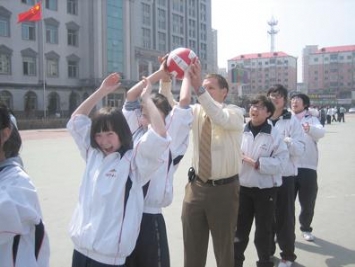News & Media
Principal Bill Wilmsen '90 Participates in Chinese Exchange Initiative
May 27, 2010
 May 27, 2010, Greencastle, Ind. — "When Bill Wilmsen walked through his front door last month for the first time in two weeks, he had more than just four suitcases packed with gifts for family and friends," begins a story on the 1990 DePauw University graduate in the Herald Argus of Laporte, Indiana. "He brought with him even more knowledge and insight into an eastern country and its education system. The Kesling Middle School principal traveled to China through the Chinese Exchange Initiative, a program that builds relationships between Chinese and American schools, and spent a week each in Beijing and Shenyang, the capital of China’s Liaoning province."
May 27, 2010, Greencastle, Ind. — "When Bill Wilmsen walked through his front door last month for the first time in two weeks, he had more than just four suitcases packed with gifts for family and friends," begins a story on the 1990 DePauw University graduate in the Herald Argus of Laporte, Indiana. "He brought with him even more knowledge and insight into an eastern country and its education system. The Kesling Middle School principal traveled to China through the Chinese Exchange Initiative, a program that builds relationships between Chinese and American schools, and spent a week each in Beijing and Shenyang, the capital of China’s Liaoning province."
During his trip, which took place last month, Wilmsen "took in the sights, met with educators and toured more than a dozen schools," notes the article.
"I was really comfortable with it because I’ve had some experience being overseas," he tells the newspaper. "In college at DePauw University in Greencastle, Indiana, I spent a month in Sierra Leone, Africa, which now is the poorest country on earth. It was very harsh conditions -- I lost 30 pounds in a month when I was there. ... I have been to Europe too -- spent a month in Germany -- and visited Canada, Mexico, the Caribbean. So, I had experience being out of the country. I was open to the idea. I thought it was exciting." (at right: Wilmsen interacts with students in China)
In China, Wilmsen -- who was a history major at DePauw -- adds, "One thing I noticed is that the kids are all focused. I was thinking, ‘I wish our kids were that focused here.’ But then it took me about a week to realize that at every level, (Chinese students) need to apply to go to their school ... In China, they are interested in how we get our kids to creatively think. I think one of the advantages in this country is that our kids know how to think on their own, how to problem solve, how to work collaboratively to solve issues, and that’s a result of how we educate kids in the United States. They were very interested in that, but at the same time ... when you’re talking about collaborative work and things like that, it takes time. If you have 60 kids ... it’s hard to do collaborative type activities. So, in China, it’s more structured. There are a lot more kids. I’m not faulting their system, because when you have that many kids, you have to have order."
Read more at the Herald Argus' Web site.
Contact Us
Communications & Marketing

Bob Weaver
Senior Director of Communications
- bobweaver@depauw.edu
- (765) 658-4286
-
201 E. Seminary St.
Greencastle, IN 46135